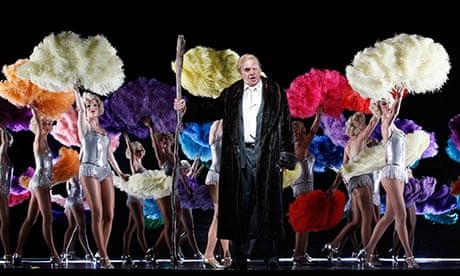Though Ring cycles have proliferated throughout this Wagner bicentenary year, Opera Australia's is rather special. It's the first time the company has mounted a staging – only the second time, in fact, that any totally homegrown production of the Ring has come to fruition in Australia – and it has taken up the challenge head on, unveiling all four productions within eight days and making the three complete cycles the centrepiece of a month-long Wagner festival in Melbourne.
The run-up to the first night of Das Rheingold was hardly trouble-free either. In June the original conductor withdrew from the project because of problems of "personal chemistry", while with just two weeks to go, illness forced the baritone singing Alberich to step down as well. The Finn Pietari Inkinen, whose plans to conduct a Ring in Palermo had fallen through, took over in the pit, while Warwick Fyfe, originally the understudy for Alberich found himself promoted; both are among the real successes of this Rheingold. How much the production itself indicates about the direction the whole tetralogy will take is much harder to assess.
In a programme note the director Neil Armfield talks of referencing "our contemporary world throughout, but without surrendering to literal representations or the seductions of effect for its own sake" and of finding parallels between the end of the world that Wagner depicts and the economic and ecological catastrophes of the 21st century. Certainly the theatricality of what Armfield and his designer Robert Cousins have done, sometimes on a virtually bare stage with just a giant mirror to provide an element of ambiguity, is often striking.
In the opening scene writhing bodies of different shapes and sizes all dressed for the beach represent the Rhine, with the Rhinemaidens emerging from them like fugitives from a Busby Berkeley dance routine; at the opposite end of the evening, the rainbow bridge that leads Wotan and the gods to Valhalla is lined with more carefully choreographed chorus girls in a whole spectrum of coloured costumes. Those and similar ideas, like the presentation of Alberich's Tarnhelm transformations as the tricks of a variety-show magician, are wittily effective while others, such as the stuffed animals dotting the stage for Wotan's first confrontation with the giants, Fasolt and Fafner, who then burst through the back wall in the baskets of two hydraulic cherry pickers, seem laboured, awkwardly mixing the obvious and the opaque.
Many of the characters remain only partly defined too. Terje Stensvold's rather monochrome Wotan is so far no match dramatically or vocally for Fyfe's vivid, seething Alberich, and it's left to Richard Berkeley Steele's laconic Loge to introduce some stage presence to what is otherwise a rather uncharismatic collection of gods. The Rhinemaidens, Lorina Gore, Jane Ede and Dominica Matthews, add another layer of pizzazz; that's a quality that could also emerge elsewhere as the productions bed in, while Inkinen's conducting, which already is full of good things, not least the transparency that he and the Melbourne Ring Orchestra bring to so many of the textures, might acquire a bit more weight and character when it's really needed.
Further performances 27 November, 6 December. Box office: 03 9685 3700.

Comments (…)
Sign in or create your Guardian account to join the discussion